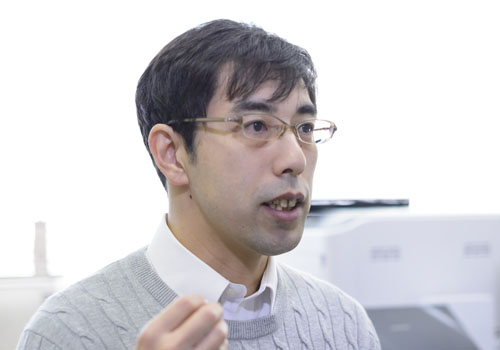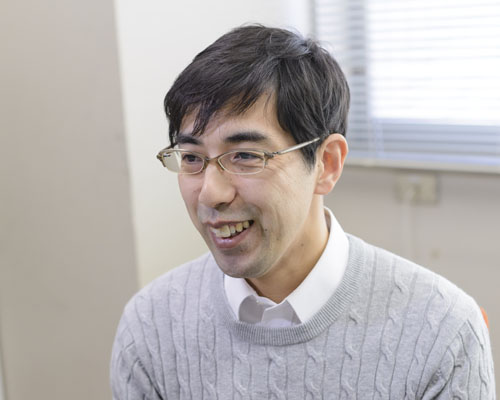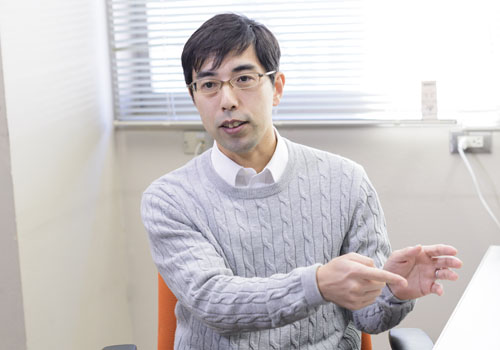
Special interview

Fiction that continues to paint a picture along with creating a "society where it is easy to live"
Minao Kukita
Associate Professor
【Graduate School of Informatics】
Department of Social Informatics
【School of Informatics】
Department of Human and Social Informatics

What type of impact science and technology have on people and society is of great interest
-Professor Kukita, please tell us about your research.
I am researching philosophy and ethics within informatics. There is interest into how the distribution of information and communication using languages and symbols came about and what kind of relationship society, science and technology and humans have with it. In particular, recent developments in artificial intelligence and robots are remarkable but I have focused my research on what impact these things have on society and how it will affect human self-consciousness and our view of the world.
Philosophy is one type of "fiction". It uses "almost everything we know", brings together what we understand and don't understand and then builds up a hypothesis
-What type of knowledge and awareness is it necessary to have to deepen the research?
There are people who say philosophy is a part of science. However, I think philosophy is something that deals with matters that have not been revealed by science. This is because it thinks up and presents a single unified way of understanding regarding what the world is and what humans and society are. Rather than being something we can use as a base on which to increase our knowledge, right now, it brings together in harmony both the things we understand and don't understand as revealed by science. I think it makes a hypothesis for "Isn't this how it is here?" Therefore, can't we say that we use almost all the things we know? For the theory of philosophy, I believe it is best to take it as one type of "fiction" when drawing a picture of a convincing story. This is not a "novel" that permits science to be ignored, it is "fiction" that draws a complete picture which is consistent with current science and technology.

What I want to do is raise the quality of society. The most important thing is education
-How do your ideas and research involve us?
There are parts of learning that are immediately useful and parts that are not. There is no easy way of understanding what I am doing but what I want to do is raise the quality of society and create a society that is democratically mature. To achieve this I am thinking about what is necessary. I want to contribute towards creating a society where it is easy to live but it is not easy to demonstrate where and how my contribution lies. As long as the students who take my course, students who receive my research guidance or those people who have touched on what I have written or talked about believe it was interesting, noticed something or grew as people, etc., then this is the fruits of my research. I think education is the one thing we must do above all. I would like lots of people to think and understand "this is what we have revealed with current science, this is what this technology is, and the convenience and dangers are this". We need to think about how we should associate ourselves with science, how we can use it effectively and prevent it going in the wrong direction, and then make a proposal to society.
The philosopher Tatsuru Uchida said that his job was "cleaning". Different to science and technology discoveries or inventions which can be used immediately by everyone and last forever, our job is not to think it is OK to put out new theories but to consider how to apply it for the world and how it can be spread and penetrate the world. Cleaning does not end after one time but must be done again every time dust accumulates. It is said that a single ant hole can cause an embankment to collapse. Nobody would ever praise you for plugging up that small hole or even notice but it would prevent great damage or loss that could possibly occur in the future. Tatsuru Uchida said this is what education is about. Our job is to raise respectable citizens as better members of society and people who get on with their lives properly in society.
Ethics is also something that divides whether something done is good or bad. However, it also has the aspect of encouraging vigorous research and development by creating a state in which tasks can be easily performed and allows us to say "if we have gone this far, it is OK to freely continue on from here." If scientists and technicians emphasized that they had to "deal with having ethical considerations", society would probably feel relieved and I believe this would create a good relationship of trust between society and scientists. I would like to create this type of relationship of trust and be of some use in ensuring research and development can be performed easily.
"I want to do something with him!", "Let's work on it together Kukita" - That's the reason I am here now
-Professor Kukita, how did you come to be doing this research?
During high school I liked mathematics but I entered the department of literature. I read various books but was unable to narrow down what I wanted to do. I thought that studying philosophy would allow me to respond to various things. However, the top reason was meeting a teacher which made me say "this is the person I want to learn from!" during my major assignment guidance.
The reason I am here is because of the feeling of "I want to study with this person!" and the temptation of "perhaps there is something we can do together?" I was guided by this kind of personal relationship and most of what I am working on now originated from this. I was intent on being able to respond to various things and as a result and doing this now, that's how it is. I am involved in developing software that assists work that digitizes handwritten manuscripts by people long ago, I call it "reprinting". This is because I was always interested in languages and communication. I'm doing this research while focusing on my own interests and being guided by people. The reason I can do this is because I have studied philosophy. I just arrived at this outcome somehow (laughs).
The "study of logic" involves researching the formal aspect of language. It is similar to being a single field of mathematics and is a different abstract to languages that we normally use. I like languages so when I thought about problems concerning languages, I just realized that "I had to study logic". Logic is the foundation of computing and has a close relationship with artificial intelligence as well. I also learnt programming. Now you can see that artificial intelligence is making amazing advances and I felt that "this would end up being a remarkable thing!" I heard that in American and Europe they were researching giving machines human moral behavior and decision making in place of humans. I intuitively thought this to be something important while finding it interesting. If we were able to give this ability to machines, we would have to ask "What are humans?" and "What is the relationship between humans?"

I'm glad I came to Nagoya University - It is a place where I can cooperate with various people and improve the world
-Do you have a message for students wishing to join the school of informatics?
Recently, in the field of natural science which includes psychology, neuroscience, evolutionary biology and ethology, we have obtain a variety of new knowledge concerning morality. I believe we have to collate this knowledge and come up with a new answer for the question of "what is morality?" Upon reconsidering the importance of emotional and physical properties for morality, I think I would like to research on whether artificial intelligence is possible through cooperation with people from the fields of neuroscience, cognitive science, robotics and artificial intelligence. Instead of having a machine behave or make a moral decision in place of a human, I want to consider from a new point of view that asks "what is morality?" while attempting to create an ethical machine. I would like to reconsider morality in the context of cutting-edge science and technology. However, I think there are probably some things that cannot be perceived in terms of morality in science and engineering.
I am also interested in the difference in the moral outlook between Japan and the West, as well as both their good and bad points. I think this multi-faceted point of view is important. The society in which we now live is different but, for example, the people in the Meiji era criticized the modernizing world while Western civilization came into their lives with great impetus they discussed both the pros and cons for replacing Japanese traditions with those from the West. Soseki Natsume had a positive opinion about modernization but I think he also simultaneously felt there were some aspects that were not good. I believe that this type of conflict created Soseki's deep insight into society and humanity. When considering morality, incorporating a scientific point of view and comparing thinking from the West and Japan might provide us with an opportunity to take another good look at people and society.
The reason I am glad I came to this faculty and graduate school at Nagoya University is that there are many people from various fields. Engineering, mathematics, aesthetics, philosophy, psychology, cognitive science and computer science…there are really so many different people and they are all exchanging ideas every day. Isn't it the most ideal place for engineering-minded people with an interest in ethical issues such as how we should use technical things in society? I believe it is also perfect for those people who aspire to humanities and think about how we should turn and face science and technology. I think it might be good for people like me who cannot decided what they want to do (laughs). "Late Specialization" is not specializing in a subject as soon as possible, and is one of the features of the School of Informatics in which you first firmly gain a wide range of knowledge and education and then you can specialize. I welcome people who want to make the world a better place while cooperating with many different people.
